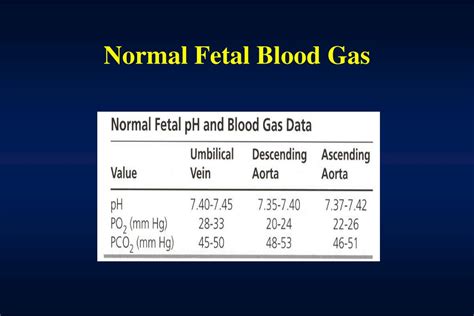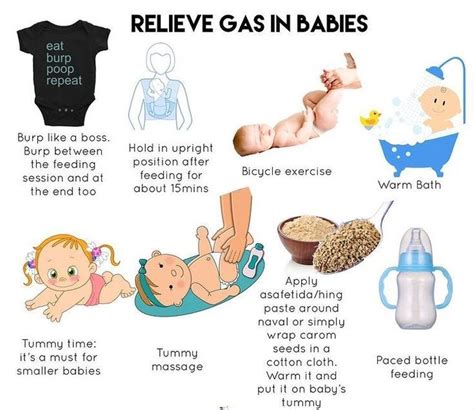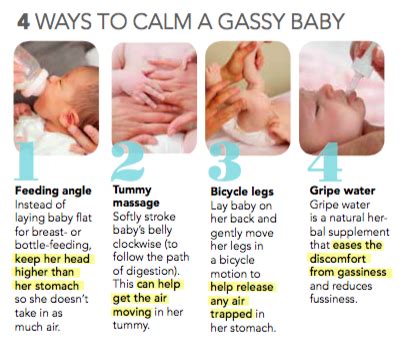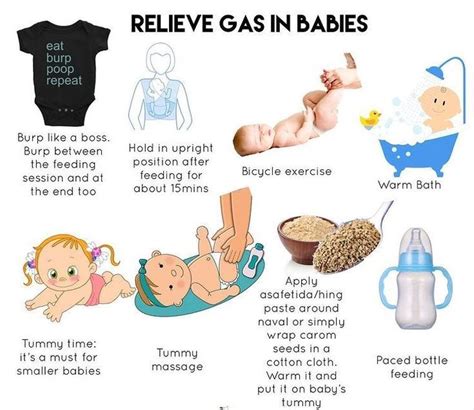Intro
Ease newborn gas with simple remedies, soothing techniques, and dietary changes, relieving discomfort and promoting healthy digestion, colic relief, and infant comfort.
Alleviating gas in newborns is a common concern for many parents. Newborns are prone to gas due to their immature digestive system, which can lead to discomfort, fussiness, and sleepless nights. As a parent, it's essential to understand the causes of gas in newborns and learn effective ways to alleviate it. Gas in newborns can be caused by various factors, including swallowing air during feeding, sensitivity to certain foods, and an underdeveloped digestive system. By understanding these factors, parents can take proactive steps to reduce gas and promote a comfortable and healthy digestive system for their baby.
Newborns are still learning how to navigate the world, and their digestive system is no exception. The digestive system of a newborn is still developing, and it can take some time for it to mature. During this time, gas can build up, leading to discomfort and fussiness. Additionally, newborns may swallow air during feeding, which can contribute to gas. This is especially true for bottle-fed babies, as they may swallow more air than breastfed babies. Furthermore, some babies may be sensitive to certain foods, such as dairy or soy, which can cause gas and discomfort.
Gas in newborns can be a challenging issue to address, but there are several strategies that parents can use to alleviate it. One of the most effective ways to reduce gas is to ensure proper feeding techniques. For breastfed babies, this means ensuring a good latch and avoiding overfeeding. For bottle-fed babies, it's essential to choose the right nipple size and flow rate to reduce air swallowing. Additionally, parents can try burping their baby regularly, especially after feedings, to release any trapped air. By taking these steps, parents can help reduce gas and promote a comfortable and healthy digestive system for their baby.
Understanding Gas in Newborns

Causes of Gas in Newborns
The causes of gas in newborns can be complex and multifaceted. One of the primary causes of gas is swallowing air during feeding. This can occur when the baby is not latched properly or when the nipple size and flow rate are not suitable for the baby's needs. Additionally, some babies may be sensitive to certain foods, such as dairy or soy, which can cause gas and discomfort. Other causes of gas in newborns can include an underdeveloped digestive system, food allergies, and intestinal bacteria imbalances.Signs and Symptoms of Gas in Newborns

Diagnosing Gas in Newborns
Diagnosing gas in newborns can be a challenging task, as the symptoms can be similar to those of other conditions. A healthcare professional will typically diagnose gas in newborns based on a physical examination and medical history. The healthcare professional may also ask questions about the baby's feeding habits, stool patterns, and overall behavior. In some cases, the healthcare professional may order diagnostic tests, such as a stool test or an abdominal X-ray, to rule out other conditions.Alleviating Gas in Newborns

Feeding Techniques to Reduce Gas
Feeding techniques play a crucial role in reducing gas in newborns. For breastfed babies, a good latch is essential to prevent air swallowing. Parents can ensure a good latch by positioning the baby correctly and supporting the breast. For bottle-fed babies, choosing the right nipple size and flow rate can help reduce air swallowing. Parents can also try feeding their baby in an upright position to reduce gas.Home Remedies for Gas in Newborns

Natural Remedies for Gas in Newborns
Natural remedies can be a safe and effective way to alleviate gas in newborns. Some of the most popular natural remedies include probiotics, which can help promote a healthy balance of intestinal bacteria. Other natural remedies include fennel tea, which can help soothe the baby's digestive system, and chamomile tea, which can help calm the baby and reduce fussiness.Medical Treatments for Gas in Newborns

When to Seek Medical Attention
While gas in newborns is a common issue, there are times when medical attention is necessary. Parents should seek medical attention if their baby exhibits severe symptoms, such as vomiting, diarrhea, or refusal to feed. Additionally, parents should seek medical attention if their baby has a fever, is lethargic, or shows signs of dehydration. By seeking medical attention promptly, parents can ensure their baby receives the necessary treatment and care to alleviate gas and promote a healthy digestive system.What are the common causes of gas in newborns?
+Gas in newborns can be caused by swallowing air during feeding, sensitivity to certain foods, and an underdeveloped digestive system.
How can I alleviate gas in my newborn?
+Alleviating gas in newborns requires a comprehensive approach that addresses the underlying causes and symptoms. This can include ensuring proper feeding techniques, burping the baby regularly, and trying home remedies such as gripe water or natural remedies like probiotics.
When should I seek medical attention for gas in my newborn?
+Parents should seek medical attention if their baby exhibits severe symptoms, such as vomiting, diarrhea, or refusal to feed. Additionally, parents should seek medical attention if their baby has a fever, is lethargic, or shows signs of dehydration.
As a parent, it's essential to remember that gas in newborns is a common issue that can be managed with the right techniques and strategies. By understanding the causes and symptoms of gas, parents can take proactive steps to alleviate it and promote a comfortable and healthy digestive system for their baby. Whether it's through proper feeding techniques, home remedies, or medical treatment, there are many effective ways to reduce gas and soothe the baby's digestive system. By working with a healthcare professional and staying informed, parents can ensure their baby receives the best possible care and attention to alleviate gas and promote overall health and well-being. We invite you to share your experiences and tips on alleviating gas in newborns, and we hope this article has provided you with valuable insights and information to help you navigate this common issue.
